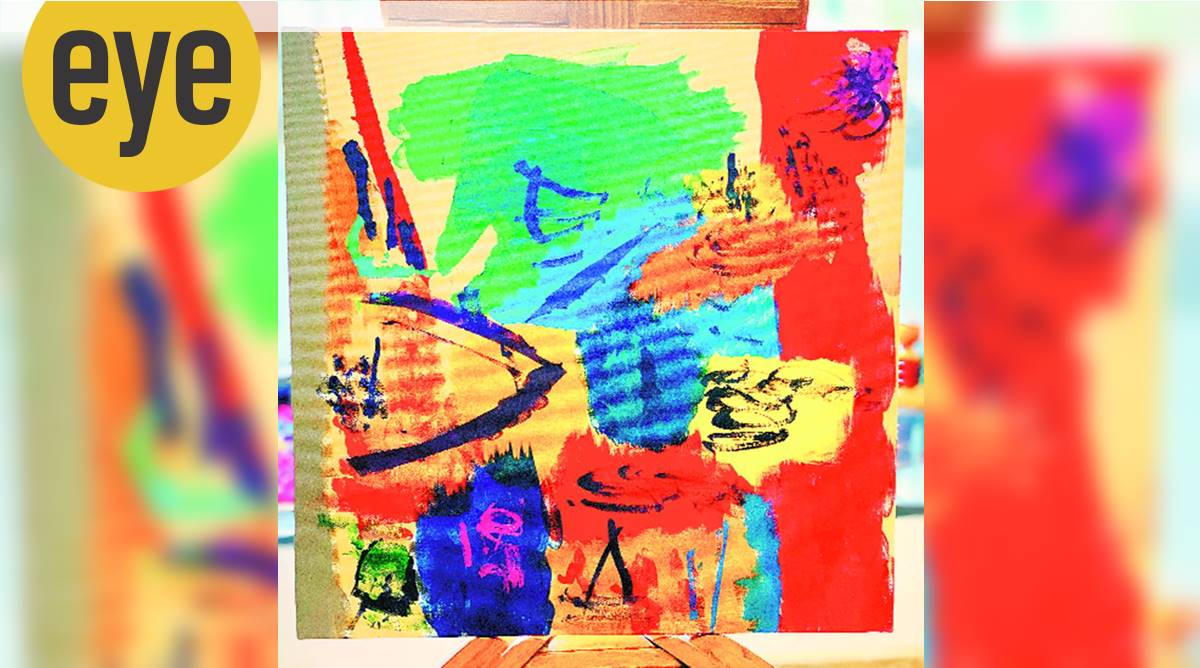 A lockdown creation by a teenager, whose indomitable will to take on his epilepsy and autism comes from his mother
A lockdown creation by a teenager, whose indomitable will to take on his epilepsy and autism comes from his motherDisability rights and identity are the affirmative action of this moment in time. Aatmanirbhar Bharat is incomprehensible when even one Indian is unable to see pride in their authentic self. Owning who we all are is the only right path to a true plurality of identities in our human collective. When we cannot celebrate who we are, we are apologising for being ourselves. We feel lost, and our human union loses.
Owning who we are requires thinking in terms of reality rather than normality. After all, what we think of as “normal” is hardly a guarantee we live with for a lifetime. The illusion of normal can be lost with a single stroke, haemorrhage or accident. Any one of us could experience that heartbeat in time when we enter the ranks of the disabled. When we accept this reality, when we acknowledge our common vulnerability, we will realise that the way we treat a person with a disability today may be the way we ourselves are treated tomorrow.
When I lived the better part of 18 months on the fringes of disability and impairment, I realised what a poltroon I was. Far from being brave, I shied away from battling my circumstances. I gave up on life and living. I made excuses for myself, accepted defeat and deliberately closed my eyes to the distant silver linings that were mine to reach were I brave enough to make an effort.
Pity from relatives, friends and antemortem mourning was of no help to me. The insidious treacherous charity I was being smothered with, the lamentable generosity that was given me out of a sense of obligation — it was this ceremonious civility that gave me permission to wallow in self-pity.
Having been written off by those who once fawned over my strong presence, it was in my mother’s, partner’s and siblings’ tough love that I found a road to becoming someone, anyone, anything, even remotely worthy to myself. These tough beings shocked me into battling life, fate, destiny and stereotype. In their unsparing love and demand for a brave fight from me, I found the courage and stamina I needed to let go of the illusion of “normal,” and accept reality as it unfolded in the ensuing days.
The disabled do not ask for our pity or charity. They are not asking for political correctness. These are people, humans like us, with ticking hearts and thinking brains, with flesh, bones and bodies, not too different from our own. Blood similar to ours flows through their veins as well. They might not see like us, or hear and speak as we do, or communicate in a language we grasp or take the time to comprehend. They simply are who they are.
My dear friend Rashmi Das lives the challenging life of a single mother of a non-verbal autistic teenager. She invests daily in learning a language for which there is no dictionary or app. Scorning self-pity, she quotes, “The Samurai never gives up. He keeps at it as a sign of his dignity and courage.” She reminds me of Vivekananda and The Gita when she says, “Whenever I face extremely difficult situations, I drink from them and become very very strong.”
Chintu, who has both epilepsy and autism, doesn’t sit on the sidelines and wish his life were “normal.” In fact, if given a chance and a level playing field, he can be as productive if not more so than neurotypical persons. As Chintu recovers from a cluster outbreak of seizures that started during COVID-19, Rashmi maintains his regimen of walks and being one with nature, his exercise routines, and abstract painting classes (the photo featured is Chintu’s lockdown creation). Rashmi has always advocated — no, demanded — dignity and ability for her son. She insists that Chintu be seen as an able autistic teen who also has epilepsy. These realities do not diminish his achievements or his quality of life.
People like Chintu patiently make their peace as outliers in a world that does little to make their journey easier or more welcoming. We console ourselves with the notion that our expressions of pity, admiration and “aren’t you brave” are what they need to face the day. What people who are disabled need — and what takes effort on our part— is someone who takes the time to communicate with them, who makes the effort to understand and connect in a way that might be foreign but that is as much of the stuff of real life as anyone’s.
For this world to be a civil society of diverse yet connected humans, of people who share a common humanity, we must guarantee financial allowances, equality and access of healthcare, occupational therapy, speech and language therapy and most of all, respect and regard for the disabled’s unique identity and place in our lives. I have spent the better part of my 47 years being considered “normal.”
Having lived for 18 months as a person with a disability, I can tell you that what I most needed was simply an honest and earnest hearing that is easily afforded without much effort from those who think of themselves as normal. When we give this hearing to our friends and neighbours with disabilities, we discover that they are the better expressions and versions of ourselves. We move from normality to reality. We finally become human.
Suvir Saran is a chef, author, educator and world traveller
📣 The Indian Express is now on Telegram. Click here to join our channel (@indianexpress) and stay updated with the latest headlines
For all the latest Eye News, download Indian Express App.